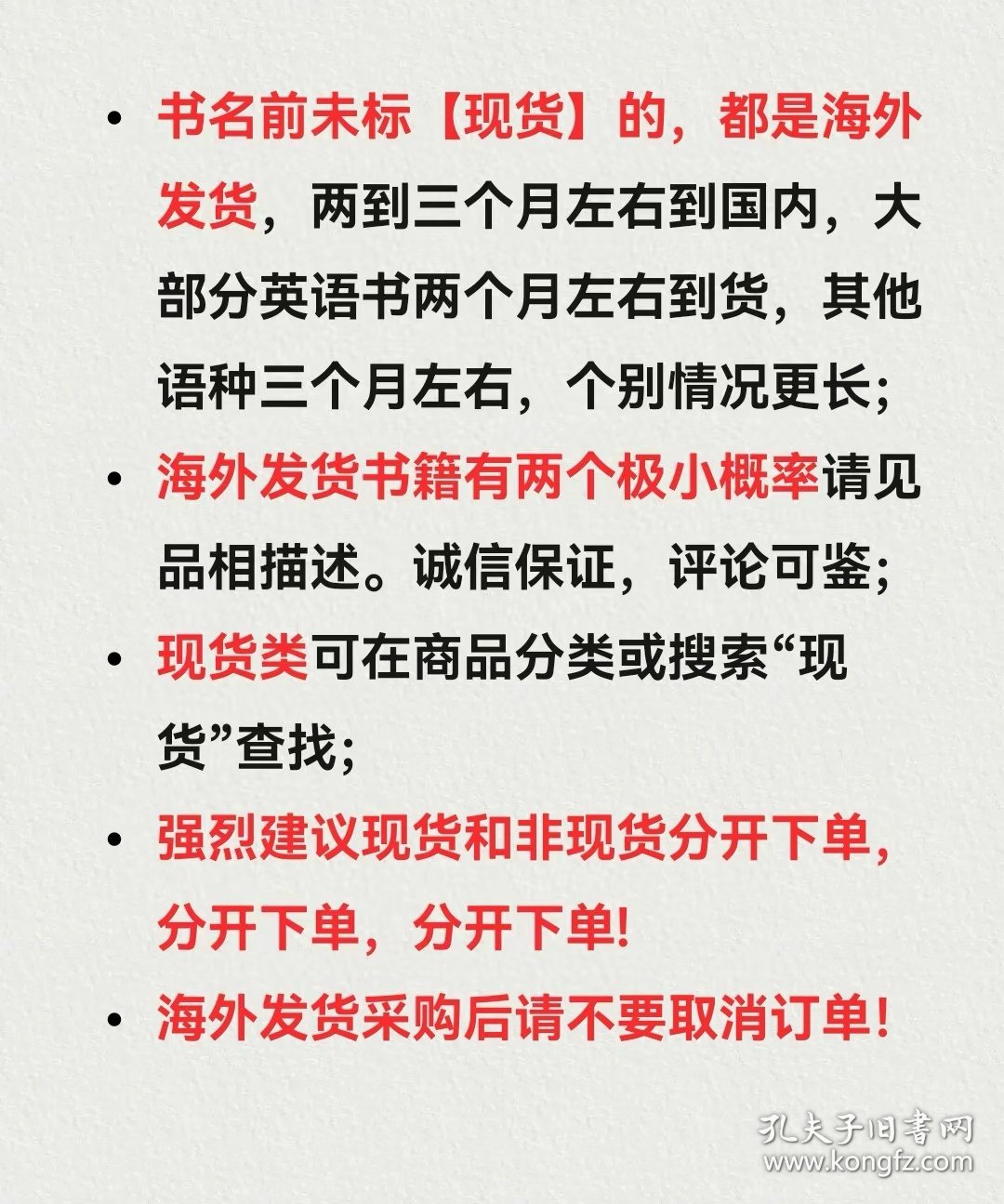
【BOOK LOVERS专享134元】The Island: W. H. Auden and the Last of Englishness 英文英语原版 精装 Faber
2024年8月出版 定价25英镑 全新正版 全店一次两本即享优惠 包邮 诚信保证 评论可鉴
¥ 141 全新
仅1件
海外欧洲
认证卖家担保交易快速发货售后保障
作者Nicholas Jenkins
出版社Faber & Faber
出版时间2024-08
装帧精装
页数768页
上书时间2024-07-01
- 在售商品 暂无
- 平均发货时间 9天
- 好评率 暂无
- 店主推荐
- 最新上架
商品详情
- 品相描述:全新
-
未标【现货】的都是海外发货,请不要中途取消订单
以竞争力价格提供英法德日西意俄语种原版书籍,百余万各语种新书及精美绝版旧书持续上架,未上架可联系报价、订购。
海外发货书籍 2-3月左右到国内,大部分英语书较快,两个月内基本能到货。其他语种到货周期不稳定,快的两个月内,慢的三个多月甚至更长,对时间有严格要求的书友请慎重。
以下两个极小概率请书友注意,别因此耽误您的使用,更别伤了和气:
1、全新正版,非海淘旧书,虽每本书都是空运回国尽量保证品相完美,但有极小概率运输所致小瑕疵。因为国外换货经济和时间成本高,所以如遇小瑕疵,每本补偿5或10元(视单本价格而定),严重瑕疵可以退换货。具体到七星文库,函套有极小概率有小瑕疵,但书本身能保证完好。如函套有瑕疵,每本补偿10元。
2、出版社库存不断变化,有极小概率采购不到,而且可能等了很长时间才得到反馈。法语书可以很快核实是否有库存。
- 商品描述
-
A groundbreaking reassessment of W. H. Auden's early life and poetry, shedding new light on his artistic development as well as on his shifting beliefs about political belonging in interwar England.
W. H. Auden is a towering figure in modern literary history with a complex private self. Hannah Arendt wrote that he had 'the necessary secretiveness of the great poet'. The Island lays bare for the first time some of the most telling 'secrets' of Auden's early poetry, his world, his emotional life, his values and the sources of his art.
In a book that is an argument but also a story, Nicholas Jenkins gives compelling readings of iconic poems. He presents Auden in the inter-War years as both a visionary writer, creatively dependent on dreams and intuitions, and a traumatized poet, haunted by war and suffering, and shadowed by his outsider status as a privileged but queer man.
The Island considers, as well, Auden's imaginative flirtations with a lyrical nationalism appealing to a poet who, for a while, felt his psyche was like a map of English culture. The narrative ends in Auden's disillusionment with these potent myths and beliefs and the time when he left 'the island'.
Auden's preoccupations - with the vicissitudes of war and the problems of love, belonging and identity - are of their time but they still resonate profoundly today.
'A superb, deeply researched study of Auden's early work and identity. Jenkins's understanding of young Auden as a poet shaped and haunted by the First World War - assimilating the influence of
Wilfred Owen, Edward Thomas, Robert Graves, and W. H. R. Rivers - is convincing, original, and poignant. Fusing biography, cultural history, and literary criticism in innovative and elegant ways,
The Island is a landmark publication in modernist studies.'
Heather Clark, author of Red Comet: The Short Life and Blazing Art of Sylvia Plath
'Nicholas Jenkins is one of our most perceptive and resourceful'Nicholas Jenkins is one of our most perceptive and resourceful critics. In this wonderful study of the early Auden, he brings to bear history, biography, and an acute sense of the artistic moment to fashion for us a young genius who is conservative, bucolic, gay, a patriotic adherent of post-imperial Little England. Most people work backwards from a writer's ultimate reputation, but Jenkins gives us a new, unexpected image of a poet developing in the aftermath of World War I and the collapse of modernism.'
Edmund White, author of The Humble Lover
'The Island is a Copernican Revolution in Auden studies, a revelatory and often exciting book that presents a new and convincing account of Auden's early years. It explores, for the first time, the deep connections between the inner workings of his poems and the worlds of politics and economics. By bringing to light Auden's ambition to be a national poet, Jenkins transforms our understanding of not only Auden himself but all of modernist literature.'
Edward Mendelson, author of Early Auden and Later Auden
— 没有更多了 —
















以下为对购买帮助不大的评价